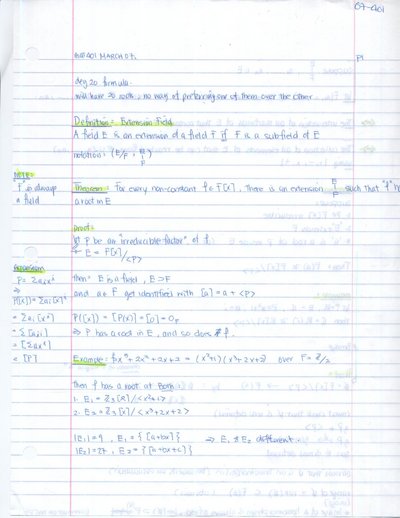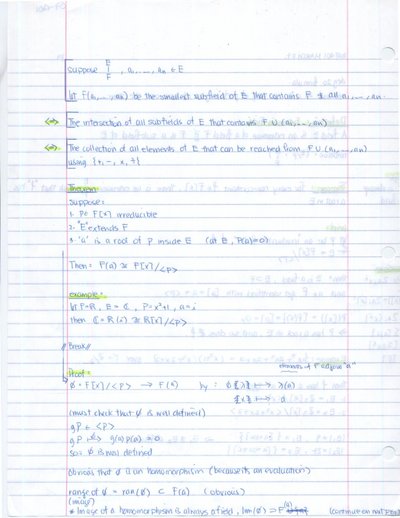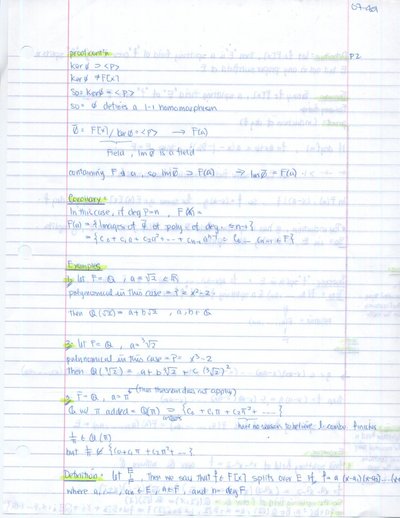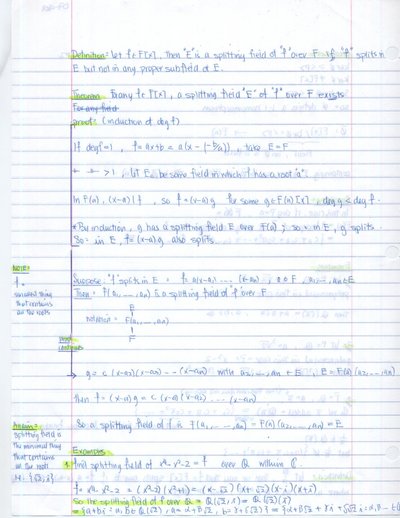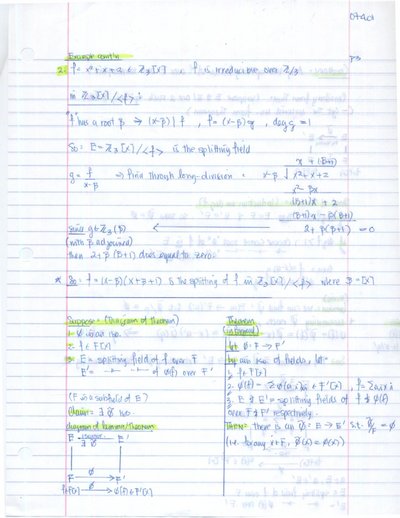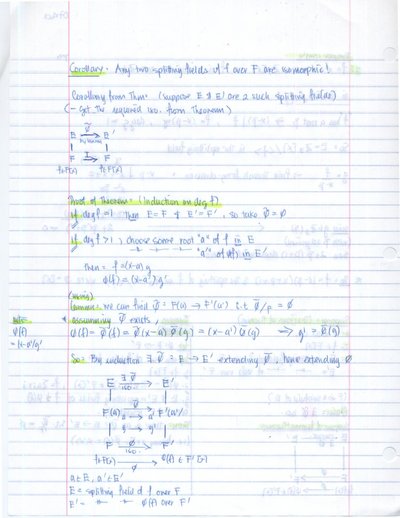07-401/Class Notes for March 7: Difference between revisions
No edit summary |
No edit summary |
||
| (12 intermediate revisions by 3 users not shown) | |||
| Line 1: | Line 1: | ||
{{07-401/Navigation}} |
{{07-401/Navigation}} |
||
{{In Preparation}} |
|||
==Class Plan== |
==Class Plan== |
||
Some discussion of the [[07-401/Term Test|term test]] and [[07-401/Homework Assignment 6|HW6]]. |
Some discussion of the [[07-401/Term Test|term test]] and [[07-401/Homework Assignment 6|HW6]]. |
||
Some discussion of our general plan. |
|||
Lecture [[07-401/Notes|notes]] |
|||
===Extension Fields=== |
===Extension Fields=== |
||
| Line 18: | Line 21: | ||
'''Definition.''' <math>F(a_1,\ldots,a_n)</math>. |
'''Definition.''' <math>F(a_1,\ldots,a_n)</math>. |
||
'''Theorem.''' If <math>a</math> is a root of an irreducible polynomial <math>p\in F[x]</math>, within some extension field <math>E</math> of <math>F</math>, then <math>F(a)\cong F[ |
'''Theorem.''' If <math>a</math> is a root of an irreducible polynomial <math>p\in F[x]</math>, within some extension field <math>E</math> of <math>F</math>, then <math>F(a)\cong F[x]/\langle p\rangle</math>, and <math>\{1,a,a^2,\ldots,a^{n-1}\}</math> (here <math>n=\deg p</math>) is a basis for <math>F(a)</math> over <math>F</math>. |
||
'''Corollary.''' In this case, <math>F(a)</math> depends only on <math>p</math>. |
'''Corollary.''' In this case, <math>F(a)</math> depends only on <math>p</math>. |
||
| ⚫ | |||
===Splitting Fields=== |
===Splitting Fields=== |
||
| Line 31: | Line 32: | ||
'''Example.''' <math>x^4-x^2-2=(x^2-2)(x^2+1)</math> over <math>{\mathbb Q}</math>. |
'''Example.''' <math>x^4-x^2-2=(x^2-2)(x^2+1)</math> over <math>{\mathbb Q}</math>. |
||
'''Example.''' Factor <math>x^2+x+2\in{\mathbb Z}_3[x]</math> within its splitting field <math>{\mathbb Z}_3[x]/\langle x^2+x+2\rangle</math>. |
|||
'''Theorem.''' Any two splitting fields for <math>f\in F[x]</math> over <math>F</math> are isomorphic. |
|||
| ⚫ | |||
'''Lemma 2.''' Isomorphisms can be extended to splitting fields. |
|||
===Zeros of Irreducible Polynomials=== |
===Zeros of Irreducible Polynomials=== |
||
(This section was not covered on March 7, parts of it will be covered later on). |
|||
===Perfect Fields=== |
|||
'''Definition.''' The derivative of a polynomial. |
|||
'''Claim.''' The derivative operation is linear and satisfies Leibnitz's law. |
|||
'''Theorem.''' <math>f\in F[x]</math> has a multiple zero in some extension field of <math>F</math> iff <math>f</math> and <math>f'</math> have a common factor of positive degree. |
|||
'''Lemma.''' The property of "being relatively prime" is preserved under extensions. |
|||
'''Theorem.''' Let <math>f\in F[x]</math> be irreducible. If <math>\operatorname{char}F=0</math>, then <math>f</math> has no multiple zeros in any extension of <math>F</math>. If <math>\operatorname{char}F=p>0</math>, then <math>f</math> has multiple zeros (in some extension) iff it is of the form <math>g(x^p)</math> for some <math>g\in F[x]</math>. |
|||
'''Definition.''' A perfect field. |
|||
'''Theorem.''' A finite field is perfect. |
|||
'''Theorem.''' An irreducible polynomial over a perfect field has no multiple zeros (in any extension). |
|||
'''Theorem.''' Let <math>f\in F[x]</math> be irreducible and let <math>E</math> be the splitting field of <math>f</math> over <math>F</math>. Then in <math>E</math> all zeros of <math>f</math> have the same multiplicity. |
|||
'''Corollary.''' <math>f</math> as above must have the form <math>a(x-a_1)^n\cdots(x-a_k)^n</math> for some <math>a\in F</math> and <math>a_1,\ldots,a_k\in E</math>. |
|||
'''Example.''' <math>x^2-t\in{\mathbb Z}_2(t)[x]</math> is irreducible and has a single zero of multiplicity 2 within its splitting field over <math>{\mathbb Z}_2(t)[x]</math>. |
|||
==Lecture Notes== |
|||
===Page 1=== |
|||
07-401 March 7 NOTES |
|||
[[Image:07-401 Mar.07.07 0001.jpg|400px]] |
|||
===Page 2=== |
|||
07-401 March 7 NOTES |
|||
[[Image:07-401 Mar.07.07 0002.jpg|400px]] |
|||
===Page 3=== |
|||
07-401 March 7 NOTES |
|||
[[Image:07-401 Mar.07.07 0003.jpg|400px]] |
|||
===Page 4=== |
|||
07-401 March 7 NOTES |
|||
[[Image:07-401 Mar.07.07 0004.jpg|400px]] |
|||
===Page 5=== |
|||
07-401 March 7 NOTES |
|||
[[Image:07-401 Mar.07.07 0005.jpg|400px]] |
|||
===Page 6=== |
|||
07-401 March 7 NOTES |
|||
[[Image:07-401 Mar.07.07 0006.jpg|400px]] |
|||
Latest revision as of 10:38, 22 April 2007
| |||||||||||||||||||||||||||||||||||||||||||||||||||||||||
Class Plan
Some discussion of the term test and HW6.
Some discussion of our general plan.
Lecture notes
Extension Fields
Definition. An extension field of .
Theorem. For every non-constant polynomial in there is an extension of in which has a zero.
Example over .
Example over .
Definition. .
Theorem. If is a root of an irreducible polynomial , within some extension field of , then , and (here ) is a basis for over .
Corollary. In this case, depends only on .
Splitting Fields
Definition. splits in , a splitting field for over .
Theorem. A splitting field always exists.
Example. over .
Example. Factor within its splitting field .
Theorem. Any two splitting fields for over are isomorphic.
Lemma 1. If irreducible over , an isomorphism, a root of (in some ), a root of in some , then .
Lemma 2. Isomorphisms can be extended to splitting fields.
Zeros of Irreducible Polynomials
(This section was not covered on March 7, parts of it will be covered later on).
Definition. The derivative of a polynomial.
Claim. The derivative operation is linear and satisfies Leibnitz's law.
Theorem. has a multiple zero in some extension field of iff and have a common factor of positive degree.
Lemma. The property of "being relatively prime" is preserved under extensions.
Theorem. Let be irreducible. If , then has no multiple zeros in any extension of . If , then has multiple zeros (in some extension) iff it is of the form for some .
Definition. A perfect field.
Theorem. A finite field is perfect.
Theorem. An irreducible polynomial over a perfect field has no multiple zeros (in any extension).
Theorem. Let be irreducible and let be the splitting field of over . Then in all zeros of have the same multiplicity.
Corollary. as above must have the form for some and .
Example. is irreducible and has a single zero of multiplicity 2 within its splitting field over .




![{\displaystyle F[x]}](https://wikimedia.org/api/rest_v1/media/math/render/svg/39bc9f9d8679fc385df3bccf9694283b796f3216)






![{\displaystyle p\in F[x]}](https://wikimedia.org/api/rest_v1/media/math/render/svg/05a3455e0a007d78c63b1dc8e435af11a6b61642)
![{\displaystyle F(a)\cong F[x]/\langle p\rangle }](https://wikimedia.org/api/rest_v1/media/math/render/svg/2770d15b8b1c46afba7300a2f126befcf996951d)




![{\displaystyle f\in F[x]}](https://wikimedia.org/api/rest_v1/media/math/render/svg/0ccbe5f3f86529d2b1b617a852f0368e16bba2d0)



![{\displaystyle x^{2}+x+2\in {\mathbb {Z} }_{3}[x]}](https://wikimedia.org/api/rest_v1/media/math/render/svg/92eff2367e18585ad66807086194229daabdda13)
![{\displaystyle {\mathbb {Z} }_{3}[x]/\langle x^{2}+x+2\rangle }](https://wikimedia.org/api/rest_v1/media/math/render/svg/886d15d7ca00052bf0a6c5ddca7fa1dda2506e5b)









![{\displaystyle g\in F[x]}](https://wikimedia.org/api/rest_v1/media/math/render/svg/f72f8996ad4efc45849398deea129c71a7e8c01b)



![{\displaystyle x^{2}-t\in {\mathbb {Z} }_{2}(t)[x]}](https://wikimedia.org/api/rest_v1/media/math/render/svg/8e1778482b45bf3ece1662d285287348820dc803)
![{\displaystyle {\mathbb {Z} }_{2}(t)[x]}](https://wikimedia.org/api/rest_v1/media/math/render/svg/3e3995c0ea75a909d21414cb1924209da3b4becf)
